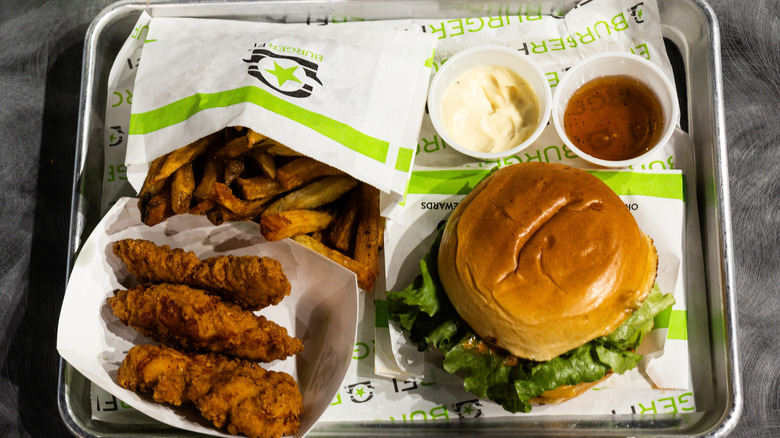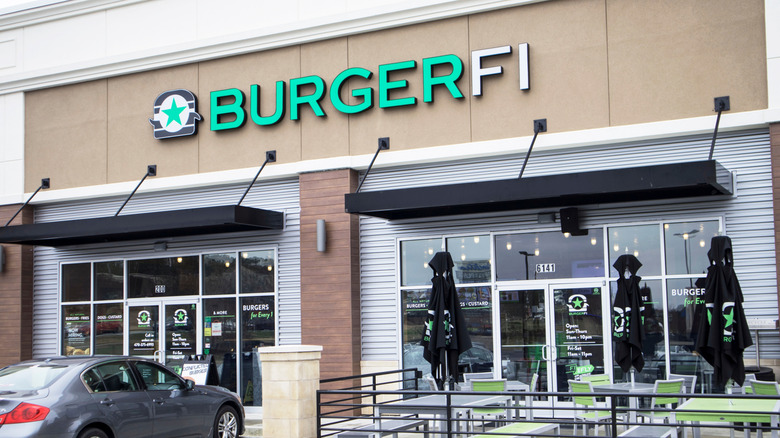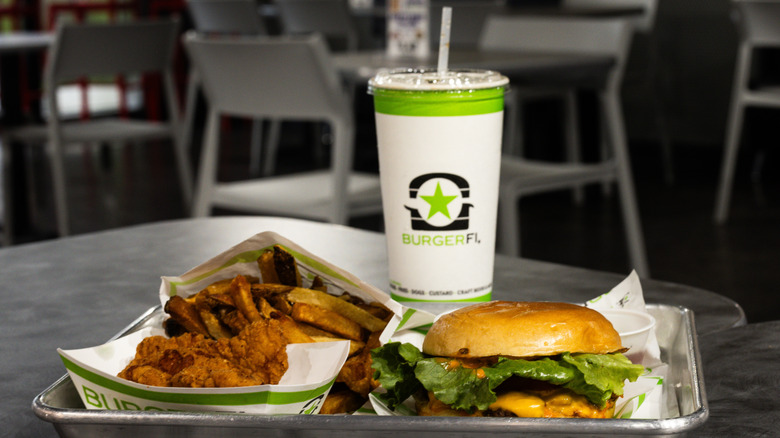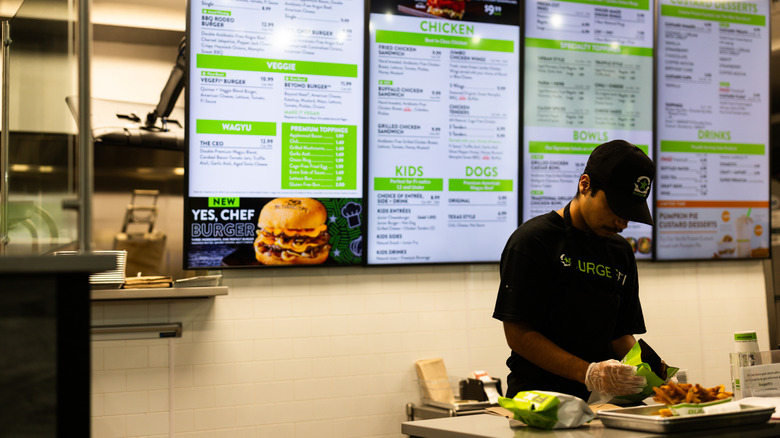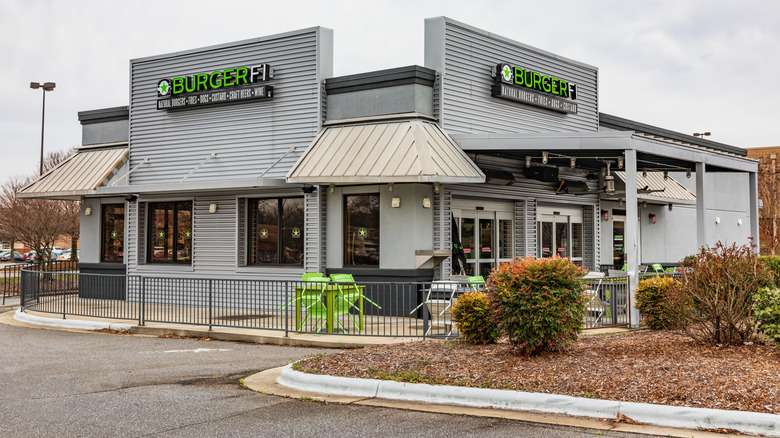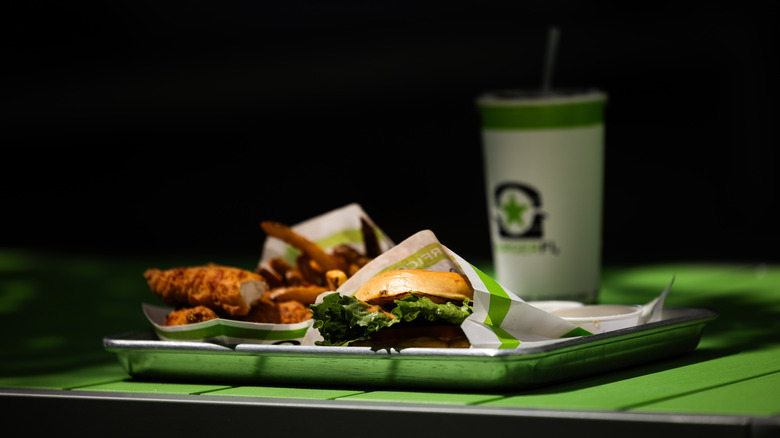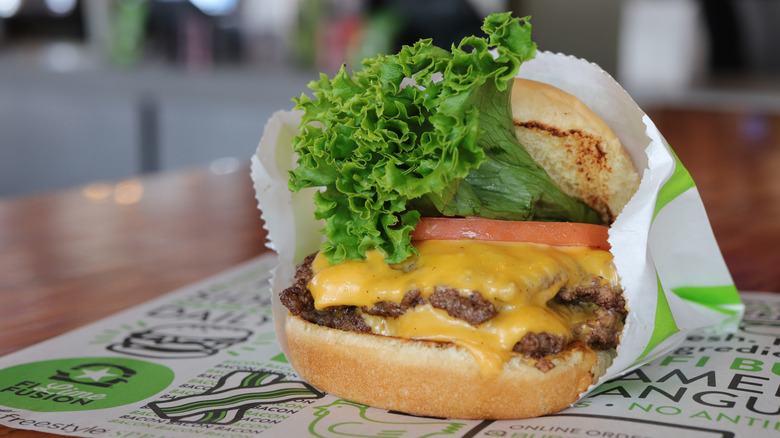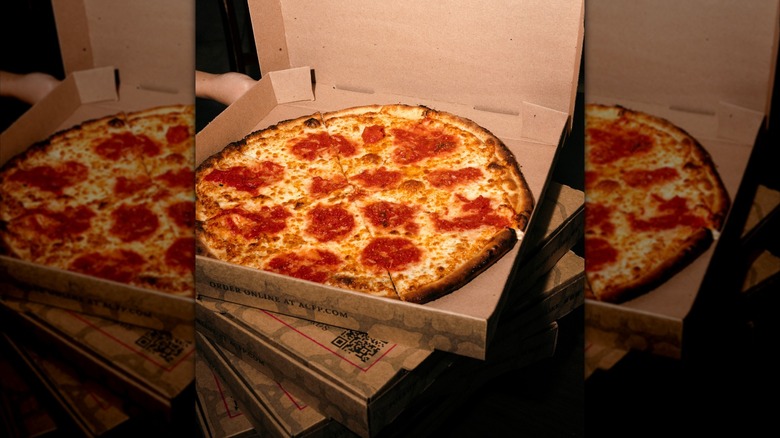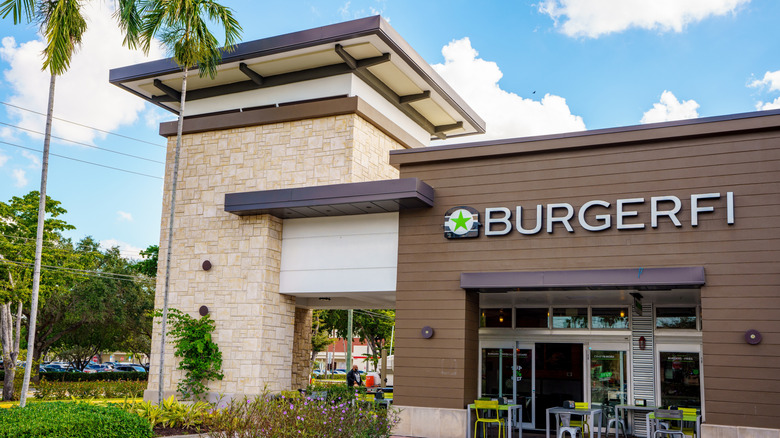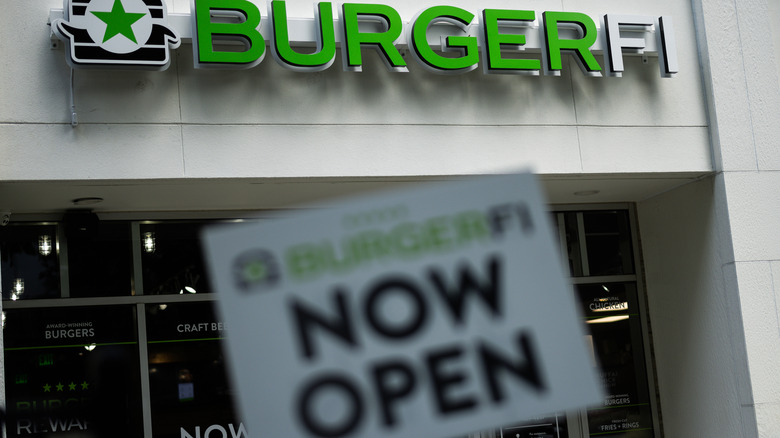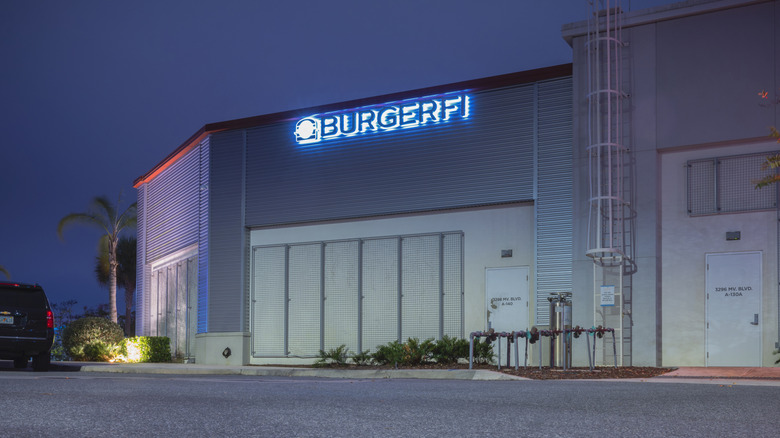Signs That BurgerFi Is Seriously Struggling
It's a tough time to run a fast-food restaurant. According to Ipsos Consumer Tracker, over a third of Americans ate at fast food chains less in 2024 than they did in the past. As the cost of living soars, customers are instead choosing to spend their money elsewhere. Or, when they are spending their money on fast food, they're far more selective about where they'll spend it. Unsurprisingly, multiple chains are feeling the pinch — BurgerFi included.
First founded in Fort Lauderdale, Florida, in 2011, the chain sits alongside the likes of Shake Shack and In-n-Out in the "better burger" department (via Technomic), a corner of the market reserved for what we like to consider fancy fast food. While price tags are higher than the likes of McDonald's or Burger King, BurgerFi's comparably high quality is visible in the absence of additives, steroids, hormones, and antibiotics in its Angus beef, fresh, hand-chopped vegetables, and never-frozen potatoes. But this attention to detail hasn't necessarily translated to a flourishing business. From restaurant closures to its ever-changing menu, it's no secret that the fast food chain has struggled recently. The following red flags have us concerned that the end is nigh for BurgerFi.
Multiple BurgerFi restaurants have closed
BurgerFi's empire has shrunk considerably over the years. In 2024, BurgerFi celebrated the opening of a new flagship store in New York, but it also shuttered eight restaurants nationwide — six franchised locations and two corporate — in the first quarter of the year. This followed the closure of 14 other locations in 2023. BurgerFi's then-CEO Carl Bachmann claimed that culling the restaurants came as a part of BurgerFi's effort to refine its portfolio. "We continued to evaluate our portfolio with a close look on cash flow and profitability," he clarified in BurgerFi's earnings call in May 2024 (via Investing.com).
But sadly, the closures didn't end there. As BurgerFi's financial challenges continued throughout 2024, the chain shuttered 19 underperforming restaurants across Florida, Massachusetts, Tennessee, Pennsylvania, New Jersey, Rhode Island, and Maryland in September. While 10 of these were BurgerFi restaurants, nine were outlets of its sister chain, Anthony's Coal Fired Pizza. Even more restaurants disappeared off the map later in the year, including those in Upstate New York when franchisees neglected to renew their agreements due to "financial issues at the corporate level" (via The Times Union).
Sales have dropped massively in recent years
Fast casual chains took a heavy hit during COVID-19, and BurgerFi was no exception. The chain's same-store sales declined by 5% while systemwide sales dropped by 7% in 2020. As other chains started to bounce back, BurgerFi continued to gain a foothold in the market, reporting an 8% drop in sales in 2023 and a 13% decrease in the first quarter of 2024. BurgerFi's CEO at the time, Carl Bachmann, pinned this sharp decline on poor weather (an excuse shared by other fast food chains such as KFC and McDonald's when explaining their own flailing sales in early 2024). He also claimed that the company was trying its best to contend with "a challenging consumer environment" (via Restaurant Dive).
While Bachmann insisted in January 2024 that the chain was showing signs of turnaround with the help of a new inventory and labor management system and that this would become evident in the second half of 2024, it was during this period that BurgerFi ended up filing for bankruptcy (more on that in a bit). In the quarter ending July 2024, BurgerFi had reportedly hit a net loss of $18.4 million that quarter — a significant jump from its $6 million loss a year prior — which it attributed to a mix of lower sales, higher expenses, and the extra costs that came with its efforts to restructure the company.
BurgerFi's time on the stock market was rough
As you may expect from a company that's battled a decline in sales and restaurant numbers, BurgerFi has had a pretty turbulent time on the stock market. The chain first went public on Nasdaq in December 2020 with an enterprise value of roughly $143 million. Just over three years later, however, it was revealed that Nasdaq had issued BurgerFi with a delisting notice after BurgerFi repeatedly failed to meet the minimum stock price requirement of $1 per share. The company had just closed out the week at 67 cents per share and hadn't managed to hit a share price over $1 since the beginning of December.
The notice came with the warning that BurgerFi had six months to comply and maintain a stock price of $1 or more for at least 10 days in a row. This grace period was later extended for an additional six months. But at the end of August 2024, Nasdaq issued the company with yet another noncompliance notice. Not only had BurgerFi failed to file its second-quarter report on time, but its board of directors no longer had enough members. The burger chain was given 60 days to submit its plain to regain Nasdaq compliance in regards to its second-quarter report, and 45 days to map out a strategy in regards to its board. A few months later, however, BurgerFi was no longer a public company.
Operating costs have taken a toll on BurgerFi
Soaring operating costs aren't a problem exclusive to BurgerFi. A survey from Restaurant365 found that over 80% of restaurants experienced an increase in food costs in 2023, while 89% said that their labor costs had also surged. As per Vine Pair, some restaurants are even spending as much as 60% of their gross sales on labor in 2024, compared to the standard of 30 to 35% in 2019.
When it comes to BurgerFi, the chain has made no secret of the fact that it's struggling with the increase in labor costs. In an SEC filing (a kind of financial statement filed with the U.S. Securities and Exchange Commission) in August 2024, it complained that its operating expenses had primarily increased due to higher staff wages. BurgerFi also cited skyrocketing chicken wing prices as another factor, claiming that the average price had jumped by $1.70 compared to July 2023. Combined with lower sales, this isn't exactly a recipe for financial success.
It's defaulted on some loans, rent, and tax payments
If sales are low and operating costs are high, that doesn't leave much money to spare when the creditors come knocking. In April 2024, BurgerFi officially defaulted on its credit agreement with TREW Capital Management. A statement from the chain confirmed that it was no longer in compliance with its $51.3 million loan and that it was in talks with its lender.
Four months later, however, it was reported that its forbearance period (in which borrowers can temporarily pause their repayment) had come to an end. This left TREW Capital Management — which acquired the company's debt and loaned it $2 million in June — in a position to demand immediate repayment or take control of BurgerFi's assets if it so pleased.
A year earlier, a BurgerFi restaurant in Lexington, Kentucky was served an eviction notice after failing to pay both its rent and state taxes. Its unpaid debt tallied up to $22,517 in unpaid property taxes for 2022, plus $22,000 for its rent in January, February, and March of 2023. While BurgerFi clarified that this was a franchised location, this still wasn't a great look for the burger chain. It also doesn't paint the most promising picture for each individual restaurant's sales.
Some customers think the food quality isn't worth the money
Since its inception, BurgerFi has angled itself as a premium fast food restaurant. It may dole out burgers and fries like the rest of them, but the USP is that they're made with better ingredients than its competitors and that everything is powered by "an uncompromising standard for flavor and quality" (via BurgerFi). Sure, you may blanch at the prices on the menu, but the upside is that you're paying for quality you'll struggle to find elsewhere.
The thing is, this concept only really works if you're actually serving up "quality" food. In recent years, however, some customers have felt like BurgerFi has lost its sparkle. "Used to be a great place 4 years ago, but now I am boycotting them due to a terrible experience there," said one Reddit user. "I got the breakfast burger and apparently they were out of hash browns so they put raw fries on it. I asked for a manager and showed them the raw fries they put on the burger and he responded with 'just pick them off then.'"
While the frozen custard is still hailed as a highlight, customers have accused it of serving soggy fries and dry burgers. In response to the revelation of the chain's struggles, another user noted that "it certainly doesn't help that they charge a goddamn arm and a leg for mediocre burgers." Or, as one user put it, "They priced themselves out of business."
BurgerFi made attempts to remedy its menu flaws
When BurgerFi launched, it was all about burgers and fries. That changed in late 2023 when the chain decided to enter new territory — chicken territory, to be precise. BurgerFi added three flavors of jumbo chicken wings (Original, Memphis Sweet BBQ, and Frank's RedHot Buffalo) to the menu of all restaurants. Its then-CEO, Carl Bachmann, raved about the changes in a press release. "Our chef-crafted and sensationally indulgent menu strategy makes our new chicken wings the perfect side to accompany our 100% all-natural Angus beef burgers," he said. "America loves burgers, wings, and beer. And now you can get them all at BurgerFi."
A few months later, BurgerFi also decided to make a last-ditch effort at entering the chicken sandwich wars. As per Bachmann, these chicken ventures formed part of a carefully calculated strategy intended to boost business growth. "A fast-casual burger brand should have a 10% to 15% chicken mix. And, until now, we had virtually none," Bachmann said (via Restaurant Business Online). The chain took a closer look at other gaps or flaws in its menu and set about providing other solutions, such as switching up its frying techniques to produce crispier fries (something customers had reportedly requested for a while), ditching labor-heavy items, and introducing salad bowls. It's also expanded its chicken wing offerings, adding additional flavors to the lineup in what appears to be a keen effort to cast an even wider net among fast food fans.
Investors feel duped by its acquisition of Anthony's Coal Fired Pizza & Wings
In November 2021, BurgerFi (or rather, BurgerFi's parent company, BurgerFi International Inc.) made a big announcement: it had purchased a second restaurant chain, Anthony's Coal Fired Pizza & Wings, for $156.6 million. Founded and headquartered in Florida, Anthony's was founded by Long Island transplant Anthony Bruno in 2002 after he struggled to find decent pizza in the Sunshine State.
Pizza is still Anthony's specialty to this day, with the chain named "The Best Pizza Chain in America" by USA Today's Great American Bites, but it now also offers pasta, sandwiches, and surprisingly delicious chicken wings. Like BurgerFi, however, it's struggled in recent years, with its only stores in Rhode Island and Maryland shuttering in September 2024. Investors have also voiced their discontent with the brand's acquisition, with some suing BurgerFi in April 2023 over claims that they were misled about its profitability.
With BurgerFi's stock plummeting by over 10% in the wake of purchasing Anthony's, one New York investor filed a class action complaint. This alleged that BurgerFi "overstated the effectiveness of its acquisition and growth strategies" and "misrepresented to investors the purported benefits of Anthony's acquisition" (via WPTV), to which BurgerFi insisted that the lawsuit's claims were entirely without merit.
Multiple executives and directors have jumped ship
Every company undergoes some degree of staff turnover. However, the team behind BurgerFi has undergone some dramatic changes over the years. The biggest shift happened in May 2023 when its Chief Executive Officer, Ian H. Baines, announced his retirement. Instead of taking any kind of severance, it was revealed that he would stick around for another 12 months as a consultant, with Carl J. Bachmann — who'd previously overseen massive growth at rival chain Smashburger — unveiled as his replacement.
That same year, celebrity chef Martha Stewart quietly stepped down from BurgerFi's board of directors. She'd previously taken the job in 2021 and served as head of the board's Product and Innovation Committee, serving as a major voice in the launch of its vegan burger. Other directors started dropping like flies not long after. Four people scrambled to resign within a matter of weeks in August and early September 2024. This included Andrew Taub, managing director of the private equity firm that sold Anthony's Coal Fired Pizza & Wings to BurgerFi.
This left just two people on BurgerFi's board, and occurred on the cusp of its bankruptcy declaration, with BurgerFi also hiring Jeremy Rosenthal as its first Chief Restructuring Officer. After filing for bankruptcy, board member David Heidecorn also resigned, while CEO Carl Bachmann left in November that same year. Now that's a rapid turnover rate.
Its international expansion was a flop
From Shake Shack to Subway, all the big fast food powerhouses have an international presence. In 2016, BurgerFi announced plans to join this elite group with a newly signed partnership with franchise group Ground Round Limited. The plan was to open 10 BurgerFi restaurants in the U.K., starting with a flagship store in London's Wembley Central Square, and grow it as a major presence on the country's fast food scene. By all accounts, the move came with an abundance of optimism. "Our next goal to open 100 restaurants is in sight, and adding a location in London is a significant milestone for the BurgerFi brand," said Corey Winograd, BurgerFi's then-Chief Executive Officer, in a press release at the time.
But in retrospect, that optimism may have been misplaced. While this Wembley Central Square restaurant did indeed open — as did a second in London's Russell Square — BurgerFi's British expansion ended there. Both restaurants closed their doors for good in 2018, with radio silence from BurgerFi on its future goals for the U.K. Other international expansions met similarly bleak fates. A BurgerFi restaurant opened, then closed, in Panama, while a 2016 multi-unit deal in Kuwait also fizzled away into nothing after the first store opened in 2017. Nowadays, you'll only find BurgerFi restaurants (or what's left of its dwindling lineup) in the good ol' U.S.
It filed for and completed bankruptcy proceedings in 2024
Some of the smaller red flags of a struggling business are easy to dismiss. A bankruptcy filing isn't as easy to ignore. After reporting a net loss of $18.4 million for the second quarter of 2024, the chain revealed in August that it may have no choice but to file for bankruptcy. A filing with the Securities and Exchange Commission claimed that BurgerFi had just $4.4 million of cash on hand and that "if the Company does not receive adequate relief from its senior lender and additional sufficient liquidity from potential liquidity providers or from sales of the Company's assets to meet its current obligations, it may seek protection under applicable bankruptcy laws."
On September 11, 2024, BurgerFi officially declared Chapter 11 bankruptcy. The fast food chain's filings detailed between $50 million and $100 million in assets and somewhere between $100 million and $500 million in debt. A month later, it completed proceedings after TREW Capital Management bought both BurgerFi and Anthony's Coal Fired Pizza & Wings out of bankruptcy at auction. While it bought BurgerFi for a $10 million credit bid, it paid a considerably larger sum of a $44 million credit bid to take over Anthony's. In doing so, TREW Capital inherited 67 corporate-owned locations, the majority of which were said to be Anthony's Coal Fired Pizza & Wings while the bulk of BurgerFi stores were franchises.
BurgerFi and Anthony's Coal Fired Pizza & Wings have been split into two separate companies
In the grand scheme of things, Anthony's Coal Fired Pizza & Wings and BurgerFi weren't sister companies for long. After BurgerFi declared bankruptcy and the company was taken over by TREW Capital Management, the latter decided to split the two entities and sell them as individual businesses.
BurgerFi was bought out by Savvy Sliders, which also acts as the parent company for Happy's Pizza and Fat Boy's Pizza. Group president Casey Biehl insisted that there was plenty of potential left for BurgerFi as a brand. "Bringing it back to its roots was something that we thought would be a pretty easy task," he said (via QSR), while also explaining that it would look to provide greater systemwide support and improve its rewards program. Anthony's Coal Fired Pizza & Wings, meanwhile, went to Florida Burger Inc., a major franchisee for both Burger King and Round Table Pizza. Separating the companies may have dashed any final hopes of the two sharing a joint fast casual empire, but at least it opened doors for both to thrive in the future.
